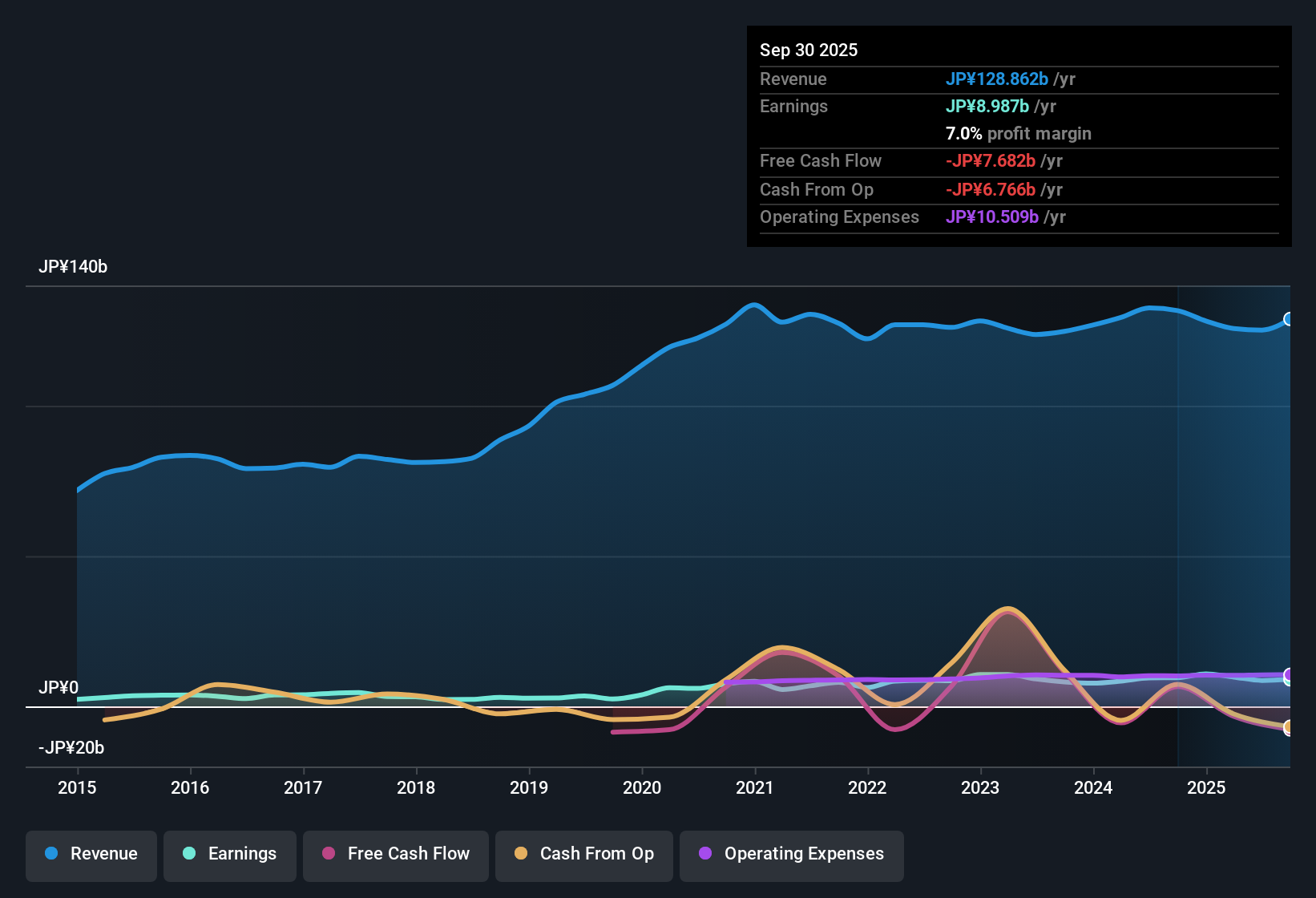- Japan
- /
- Construction
- /
- TSE:1968
Taihei Dengyo Kaisha's (TSE:1968) Weak Earnings May Only Reveal A Part Of The Whole Picture
The subdued market reaction suggests that Taihei Dengyo Kaisha, Ltd.'s (TSE:1968) recent earnings didn't contain any surprises. Our analysis suggests that along with soft profit numbers, investors should be aware of some other underlying weaknesses in the numbers.

Examining Cashflow Against Taihei Dengyo Kaisha's Earnings
Many investors haven't heard of the accrual ratio from cashflow, but it is actually a useful measure of how well a company's profit is backed up by free cash flow (FCF) during a given period. In plain english, this ratio subtracts FCF from net profit, and divides that number by the company's average operating assets over that period. The ratio shows us how much a company's profit exceeds its FCF.
That means a negative accrual ratio is a good thing, because it shows that the company is bringing in more free cash flow than its profit would suggest. That is not intended to imply we should worry about a positive accrual ratio, but it's worth noting where the accrual ratio is rather high. To quote a 2014 paper by Lewellen and Resutek, "firms with higher accruals tend to be less profitable in the future".
Over the twelve months to September 2025, Taihei Dengyo Kaisha recorded an accrual ratio of 0.21. Unfortunately, that means its free cash flow fell significantly short of its reported profits. In the last twelve months it actually had negative free cash flow, with an outflow of JP¥7.7b despite its profit of JP¥8.99b, mentioned above. It's worth noting that Taihei Dengyo Kaisha generated positive FCF of JP¥6.6b a year ago, so at least they've done it in the past. However, that's not all there is to consider. The accrual ratio is reflecting the impact of unusual items on statutory profit, at least in part.
Check out our latest analysis for Taihei Dengyo Kaisha
That might leave you wondering what analysts are forecasting in terms of future profitability. Luckily, you can click here to see an interactive graph depicting future profitability, based on their estimates.
How Do Unusual Items Influence Profit?
The fact that the company had unusual items boosting profit by JP¥886m, in the last year, probably goes some way to explain why its accrual ratio was so weak. While we like to see profit increases, we tend to be a little more cautious when unusual items have made a big contribution. When we analysed the vast majority of listed companies worldwide, we found that significant unusual items are often not repeated. Which is hardly surprising, given the name. Assuming those unusual items don't show up again in the current year, we'd thus expect profit to be weaker next year (in the absence of business growth, that is).
Our Take On Taihei Dengyo Kaisha's Profit Performance
Summing up, Taihei Dengyo Kaisha received a nice boost to profit from unusual items, but could not match its paper profit with free cash flow. Considering all this we'd argue Taihei Dengyo Kaisha's profits probably give an overly generous impression of its sustainable level of profitability. If you want to do dive deeper into Taihei Dengyo Kaisha, you'd also look into what risks it is currently facing. For example, we've found that Taihei Dengyo Kaisha has 2 warning signs (1 is a bit concerning!) that deserve your attention before going any further with your analysis.
Our examination of Taihei Dengyo Kaisha has focussed on certain factors that can make its earnings look better than they are. And, on that basis, we are somewhat skeptical. But there is always more to discover if you are capable of focussing your mind on minutiae. For example, many people consider a high return on equity as an indication of favorable business economics, while others like to 'follow the money' and search out stocks that insiders are buying. While it might take a little research on your behalf, you may find this free collection of companies boasting high return on equity, or this list of stocks with significant insider holdings to be useful.
Valuation is complex, but we're here to simplify it.
Discover if Taihei Dengyo Kaisha might be undervalued or overvalued with our detailed analysis, featuring fair value estimates, potential risks, dividends, insider trades, and its financial condition.
Access Free AnalysisHave feedback on this article? Concerned about the content? Get in touch with us directly. Alternatively, email editorial-team (at) simplywallst.com.
This article by Simply Wall St is general in nature. We provide commentary based on historical data and analyst forecasts only using an unbiased methodology and our articles are not intended to be financial advice. It does not constitute a recommendation to buy or sell any stock, and does not take account of your objectives, or your financial situation. We aim to bring you long-term focused analysis driven by fundamental data. Note that our analysis may not factor in the latest price-sensitive company announcements or qualitative material. Simply Wall St has no position in any stocks mentioned.
About TSE:1968
Taihei Dengyo Kaisha
Engages in the plant construction business in Japan and internationally.
Excellent balance sheet with moderate growth potential.
Market Insights
Community Narratives



